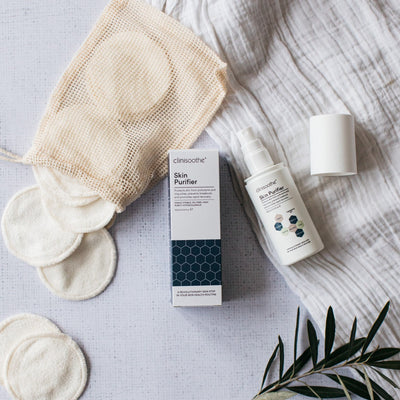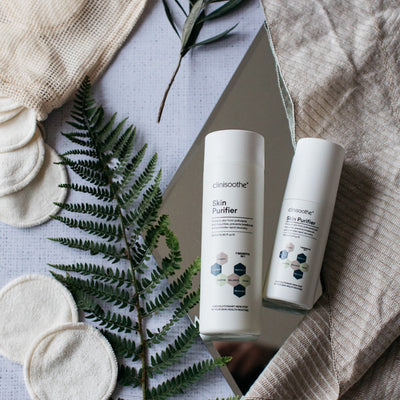
A Nutritionist’s Guide To Hormonal Acne
Acne is one of the most common skin conditions. It affects around 95% of the population aged 11-30. (NHS) Did you know acne is not just something teenagers experience during...
What Is Hormonal Acne & How To Treat It.

Acne is one of the most common skin conditions. It affects around 95% of the population aged 11-30. (1)
Did you know acne is not just something teenagers experience during puberty? It can often affect adults later on in life too. Predominantly due to hormones, adult acne affects more females than males.
To dive into hormonal acne further, we had the absolute pleasure of chatting with Emma Bardwell, specialist menopause nutritionist and author of 'The Perimenopause Solution'. Read Emma's advice below.
What is hormonal acne?
Acne is complex and something that almost all of us will experience at some point in our lives. It accounts for over 3.5 million GP appointments a year in the UK. There can be many triggers for acne which might exist in isolation or alongside one another. In the case of hormonal driven acne, androgenic (usually testosterone) sex hormones are the main driver. Androgens encourage excess oil to be produced in the sebaceous glands attached to hair follicles which then attract bacteria. The result is inflammation, a build up of pus which becomes trapped, and the resulting spot or comedone.
Is acne only seen in teenagers?
No, not at all! Some women will find they experience acne after they come off the contraceptive pill, although it usually subsides after 6-12 months. Many women also find they get spots before their period, especially around their chin and jawline. And lots find their skin flares up during the turbulent hormonal rollercoaster that is perimenopause, which is the 8-10 years leading up to your final period. Additionally there are other conditions that might also cause acne: PCOS, stress, and sometimes even during pregnancy and breastfeeding.
Does nutrition affect acne?
Not always. I have clients who have an extremely well balanced diet but who still suffer from acne. Unfortunately, many people get acne despite doing everything ‘right’. However diet is a consideration and if you’re experiencing lots of spots, it’s no bad thing to take a good look at what you’re eating and drinking. More and more research seems to be suggesting that certain skin conditions, including acne, can be helped by improving gut health.
What diet is best for acne?
We don’t have enough research to say that a certain way of eating will prevent or cure acne. That said, it makes sense to adopt a Mediterranean style way of eating as it’s anti-inflammatory, largely unprocessed and high in fibre (which is great for gut health), phytonutrients and healthy fats. Think lean protein like fish, wholegrains like oats and brown rice, colourful fruits and vegetables, peas, beans, lentils, olive oil, nuts and seeds.
At what stages during menopause are you most likely to get hormonal acne?
Acne can strike at any point in a woman’s life but I’d say perimenopause, that time when hormones are in a real state of flux, is probably most common. As oestrogen levels fall, androgen levels become proportionately more dominant which can drive the oil gland activity that often results in acne. Most women will find after menopause their skin clears up, but they often notice a whole raft of other problems such as skin starting to get dryer or itchier and losing its elasticity.
What are common food triggers for irritated skin?
An increasing body of evidence seems to point towards a possible link between high sugar diets and acne, so it pays to minimise refined carbs that could potentially spike insulin and insulin-like growth factor (IGF-1). Both increase oil production and encourage the body to produce more androgen hormones. There’s also some research suggesting dairy aggravates acne in a small subset of the population. The quickest way to work out if you’re affected is to eliminate dairy products for 2-4 weeks and see if you notice any changes. However, it’s really important to replace the protein and calcium, plus other bone-friendly nutrients like magnesium, phosphorus and boron, that you get from dairy with other dietary sources. If in doubt, seek the help of a qualified nutritionist.
How do I know if my acne is related to my hormones?
Fundamentally all acne has a hormonal component to its pathophysiology.
Is your approach to hormonal acne more inside out, or do you suggest topicals too?
Like most of the conditions I treat in clinic, I take a 360 degree approach and skin conditions are no different. Addressing any gut health issues is vitally important and is, I find, often a good place to start. Certain nutrients can potentially be beneficial too, including zinc, niacinamide, vitamin A and omega 3 fatty acids. However, I also think it’s important that we also look at lifestyle considerations such as reducing stress. I often work alongside GPs and frequently refer clients to dermatologists. If acne is affecting your confidence or you’re noticing scarring, please don’t wait to get it addressed. There is lots that can be done alongside nutrition, including oral medications and skincare treatments.
Clinisoothe+ and Acne

Clinisoothe+ is ideal for acne prone skin. Our Skin Purifier helps to protect your skin from external pollutants and impurities, preventing breakouts and promoting rapid recovery.
Game - CHANGER!
Our gentle formula has a skin neutral pH and can be applied anywhere on the face or body where any irritation, breakouts or redness occur.
The hypochlorous has a unique oxidising method of action which cleanses and provides purifying antimicrobial protection, but is also gentle on the skin: it doesn’t harm, irritate or sensitise the dermal layer.
Clinisoothe+ is non-toxic, contains no alcohol and is non-cytotoxic to re-growing skin cells. It is clinically formulated and dermatologically tested to guarantee its safety on even the most sensitive skin. It is also vegan friendly.
Try Clinisoothe+ Skin Purifier, a gentle product to add to your skincare routine. Simply spritz your skin after cleansing and allow the product to soothe redness or irritation.

Author of The Perimenopause Solution





